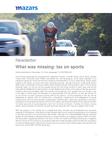
What was missing: tax on sports
This bill was presented by Congressmen Alejandro Chacón, Orlando Guerra de la Rosa, Sandra Liliana Ortiz, Hernando José Padaui and Marta Curi and its purpose, as its name indicates, is to create the sports tax which will have the following characteristics; (i) it is a national tax, whose active subject is the State, (ii) those who have checking accounts, savings accounts, credit cards and/or debit cards in Colombian financial entities will be taxable (the tax will be paid for each of the financial products held), (iii) the tax will be caused during the first three months of each year and will be automatically debited from each product, (iv) the taxable base will be, in the case of savings accounts, checking accounts and debit cards "the activity of the balances (sic)" greater than one Smlmv, and, in the case of credit cards, the allocation of a quota greater than two Smlmv, (v) the rate will be 1% of one Smlmv for each financial product held by the person, (vi) the proceeds of this tax will be distributed as follows: 50% for construction, remodeling, maintenance and adaptations of sports infrastructure, 30% for the promotion, massification, dissemination, planning, coordination, execution and advice for the practice of sports, 20% for the creation, training and maintenance of sports schools, (vii) bank accounts of social programs "such as" Jóvenes en Acción, Familias en Acción, among others, will be exempt from the tax, as well as similar accounts that "may be created in the future".
With this project: (i) An indirect tax is created that does not take into consideration the economic capacity of the taxpayer. Colombia is a highly bankarized country, where the possession of a checking or savings account is not synonymous with wealth. Although it is understandable that the collection system for bank debits is attractive because it is highly efficient, as it happens with the GMF (4x1000), the fiscal policy regarding banking is not clear; on the one hand it stimulates banking (as it happens with the refund of VAT points for purchases made with credit and debit cards and with the recognition of costs and deductions made by this means) and on the other hand it discourages it (by taxing it with taxes such as the GMF and the sports tax),
(ii) It is debatable that this law may be of parliamentary initiative and not strictly of governmental initiative. This is because, although it is not a law whose purpose is not to decree tax exemptions (but to create a tax), it does have the effect of ordering participations in national income and transfers thereof, and therefore, according to the provisions of Article 154 of the Political Constitution, it could be understood that this law should have been submitted to Congress on the exclusive initiative of the Government.
(iii) It would seem to be the revival of the sports tax created by the Council of Bogotá by means of Agreement 3 of 1967 (the District always maintained the position that Law 97/1913 empowered it to create such tax), which was later repealed by such entity by means of Agreement 90 of 2003, and notwithstanding, it continued to be charged until the Council of State declared the illegality of such charges, (iv) The tax is anti-technical since it intends to generate indeterminate and blank exemptions. This occurs when it indicates, in a non-exhaustive manner, that bank accounts of social programs "such as" Jóvenes en Acción, among others, and those of a similar nature that may be created in the future, shall be exempt from the tax.
(v) Instead of continuing to tax its taxpayers under the pretext of encouraging the practice of sports, the State should adopt real tax incentives to generate a sports culture, as Ecuador did. There, the purchase of sports equipment and services (gymnasium registrations, personal trainer payments, participation in competitions) are allowed to be deducted from income tax as personal expenses, since these items are directly related to the maintenance of a healthy lifestyle.


